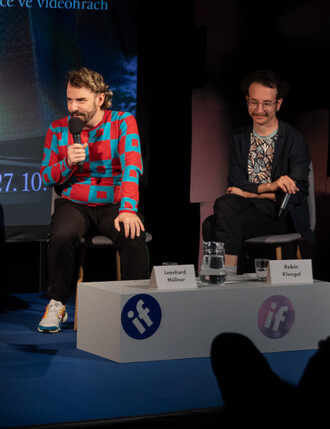Mass media production is an apparatus dominated by marketing formulas. It is essentially an attention industry, reiterating and confirming societal values over and over again – quite literally so in times of sequel mania – establishing a cultural and economic hegemony. In the Western hemisphere, the largest chunk of AAA (i.e. big budget) productions affirm the conservative to liberal capitalist ideology that has brought us to this apparent dead end of history we find ourselves in, where an ideological shift has become unthinkable in the literal sense of the word to many.
This is true not only for movies, but also for mainstream video games, which have grown to be one of the most important forms of entertainment and cannot be ignored in their role as a media that influences young people in particular. Not unlike most blockbuster movies, they establish their value constructs based on a hyperindividualist view of the world waiting to submit to the player – a world that is filled with cliches and driven by rather manicheic principles. This undue simplification is owed partly to the fact that here politics is marketing, meaning that political categories are superficially represented insofar as they can be attributed to target consumer groups, while the political role of the media is simultaneously ignored and structural critique avoided in order to “keep it safe”: For instance, AAA games advocate gender and race diversity while dialectically promoting conservative tropes of the same. They pray tolerance towards the converted and are unforgiving to those questioning their cosmovision.
Confirming the semblance of perfection
Contemporary mass media being primarily designed to sell has them trapped in a reaffirmation bubble, where tried and tested formulas – and, by extension, values and worldviews – are repeated ad infinitum. Societies thus come to breathe capitalist imagery as if it was second nature – a natural and immutable biosphere we simply don’t question in its totality.
With its commercialization during the 90s, the gaming industry spawned into place at the coming apex of late capitalism and inhaled all its features right away: Best practice models, a neoliberal focus on the individual as the world’s pivot point, unquestionable expansionist logics and male dominated gameplay and story loops with their fair share of hypermasculine tropes – some of which it seems to have difficulty to shed even in the woke 2020s: Female characters mainly appear crammed into one of two roles, which either overemphasize classic concepts of femininity or simply transform women into stereotypical blokes, while on the other hand it’s rare to see male tropes being expanded with traditionally female attributes. Mainstream games are so 1990s.
Hyperrealism – the visual language of capitalism, so to speak – doesn’t aim to recreate a physical real, but rather attempts to reaffirm our idea of something: Every video game sunset is the perfect sunset.
This critique of the gaming industry and the hyperreal visuals of mass media boils down to a desperate call for a media culture liberated from the corrupted vocabulary of late stage capitalism. Hyperrealism – the visual language of capitalism, so to speak – doesn’t aim to recreate a physical real, but rather attempts to reaffirm our idea of something: Every video game sunset is the perfect sunset. And the characters we encounter more often than not are mere archetypes, ideas of characters fit for a certain role or value they represent. In the end, a world populated by marketing stereotypes leaves little room for ambivalent figures and moral complexity.
It comes as little surprise that even in today’s People’s Republic of China – naturally one of the biggest markets in the industry – video games are through and through a hypercapitalist media. But is or was there ever a counter example?
Space to step outside the capitalist logic
In his 2018 work “Gaming the Iron Curtain. How Teenagers and Amateurs in Communist Czechoslovakia Claimed the Medium of Computer Games”, Jaroslav Švelch highlights the thematic diversity of homebrew video game production in Czechoslovakia during the 1980s: “People wrote games about Indiana Jones and Flappy the mole/chicken – but they also wrote about their friends, their favorite songs, and anti-regime protests.” Games were a “counterpoint to mainstream corporate production”, partly owing to the different production context of a centralized socialist state, but also because it remained a sort of garage industry. The result was a media genre diverse in values, characters and storylines – the sort of media utopia we can all embrace. While this subcultural industry could be compared with today’s indie scene, which also produces a variety of games that stray from mainstream tropes, the replacement of pretty much all social democracies by market democracies before the popularization of video games means that we still lack an example of a mainstream game industry allowing for cultural dissent. Just to be clear: The problem isn’t the existence of mass media, it’s that the consensus they drive forward is based on a profit motive rather than a principle of common welfare. We need games to be spaces that break out of the hegemony of ignorance and explore social issues and diverse perspectives.
Following Facebook’s very mediocre attempt in creating a hybrid social and gaming media, this endeavour is still a largely unexplored frontier. The pitfalls of capitalism are obvious here – in our current system, one can hardly think of the concept of social game hubs without also thinking of privacy infringement and outsourced control by way of gamified meritocracy. A dystopian hypercapitalist outcome seems almost pre-programmed in our contemporary production context.
Yes, this media certainly has the potential for realizing utopian visions of playful social environments: Venues in which people gather in largely public spaces, experience community adventures, form a democratic and critical exchange and build strong connections based on that. All of these things exist in principle. Still, game spaces are doing baby steps at best on their path to becoming true social media – followed by the occasional leap in the wrong direction. If history has taught us one thing, it’s that whenever capitalism swallows up significant technological innovations – like the internet – it spits out a social or environmental dystopia on the other side. We can’t hope for our political economy to produce the very tools and spaces that will emancipate us from this same political economy. For a media utopia to become reality, we need to first unshackle the means of media production from the logics of capital accumulation. In effect, we need to realize there is a world out there beyond capitalism before we can dream up the democratic and social visions of a better future.
The text was originally published in the 2021 Ji.hlava IDFF festival book.










